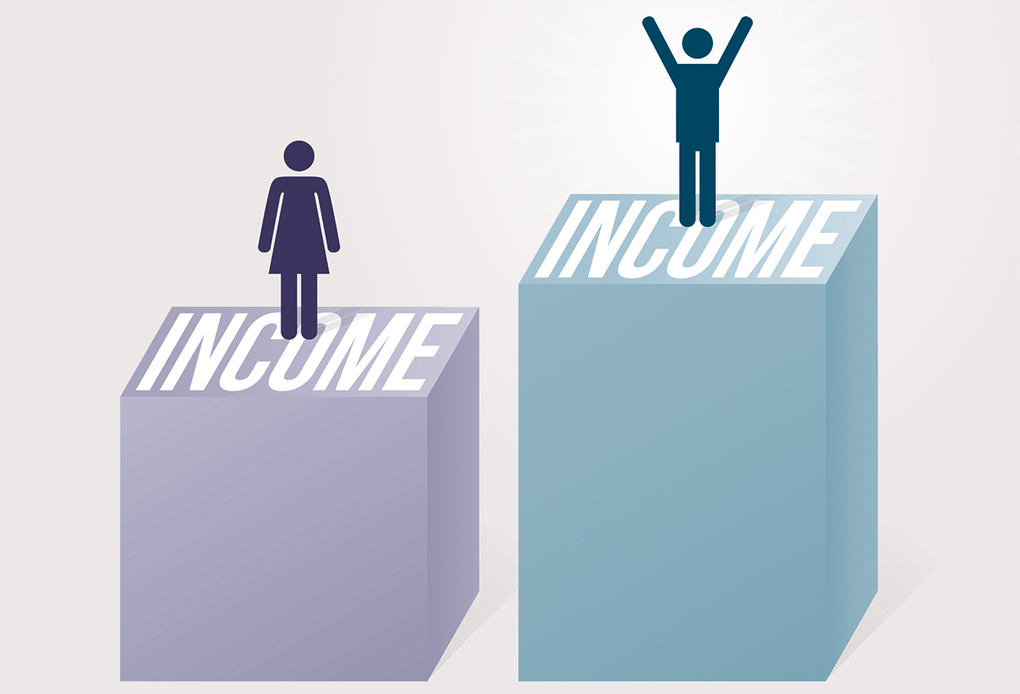
America’s run-of-the-mill slightly progressive feminist will bring up the same ailment of industrial society regardless of whether or not he or she is an actual radical leftist. This ailment is the wage gap. It is the feminist exhibit A of why the patriarchy is in full force and working day and night to oppress women.
The argument goes something like this: The average earnings of all men compared to the average earnings of all women adds up to somewhere between a 100 to 80 to a 100 to 70 ratio. From this, a progressive may argue that a woman earns something like 77 cents on the dollar that a man makes. And thus, they argue that is bad because people deserve equal pay for equal work.
At face value, this sounds like an egregious act of systemic sexism we need to hastily work on demolishing. This would be the case if there were not such a clear logical jump here.
The jump is that people think that a disparity in mean incomes means disparities in each and every individual field of work, yet this is not the case. There are no figures that indicate on a widespread scale, women are not being paid the same for equal work. Surely, this may be happening in some scattered instances, but that is not the statistic that feminists will bring up.
What they do is compare the means of the incomes between genders, and show that there is a 100 to 77 ratio or so. I believe that this does exist (and this ratio would continue to exist even if I suspended my belief). I do believe that the mean incomes between men and women indicate such a gap, yet I do not see what we should do about it if anything.
Should we get rid of it? Should we take action and make sure that the mean incomes between men and women get to a 1 to 1 proportion? I think this would be disastrous because this is the classic case of ensuring equality of outcome.
I am a proponent of gender equality, for more reasons than my female friends not hating me. A country that allows opportunities for everyone regardless of gender will have a higher standard of living, which benefits even the most sexist individuals. Social acceptance is nice too, though.
But the wage gap is not indicative of inequality of opportunity. It is indicative of inequality of outcome, which, last I checked, is something very dangerous to become upset about.
Let’s say I concede that sure, men and women should be equal at the end of the race. But why just men and women? If two men have incomes that are different, how is that just by the same standards? How is it just that any two sections of human we can divide ourselves into are unequal at the end of the game in any way?
The “equality of outcome” doctrine has been one of the most dangerous doctrines to meet humanity, considering the events of the 19th century. The Jewish population had been collecting usury for hundreds of years, giving them a leg-up on the European Christian’s they lived among.
When economic crisis hit Germany after World War 1, a successful group became the perfect scapegoats. The Jews became the haves, the Germans became the have-nots, and now history has the Holocaust.
To the East, we saw the Soviet Union demonize and massacre the Kulaks for having more food than the rest after eliminating the bourgeoisie.
One may snicker at these examples, but they are what comes of the idea of “we must end as equals.” Taken to the logical conclusion, the proposition for equality of outcome leads to various forms of redistributive totalitarianism, and that is not a fun place to end up. That is why I have serious hesitations with the demonization of the wage gap.
When we see inequality of outcome, we must look at what the cause of such inequality is. If it turns out that it was unjust (inequality from the start) then something should be done about it. If it was not due to injustice, then we should take a closer look before we jump to removing the cause, because attempting to remove the cause could come with dire consequences.
Many argue that the wage gap comes from societal expectations we have of women. We expect them to go into nursing and teaching (which tend to pay lower) so they do that. The issue with this approach is that it is impossible to explain how much of the representation of women in these fields is due to societal pressures and how much is due to female choice.
Do women choose these positions in society, or is it the patriarchal hegemon that forcefully places them here. Well, we should look at, broadly, who men and women are. Men and women are different, and that is quite clear; I cannot give birth, but why would the differences end there?
There is lots of literature on the personality differences between the genders. This study, which has over two thousand academic citations, can probably shed light onto the important gender differences that are creating the wage gap that we see.
Males were found to be more assertive and had slightly higher self-esteem than females. Females were higher than males in extraversion, anxiety, trust, and, especially, tender-mindedness (e.g., nurturance).
Keep in mind, when discussing a large group like this, differences do not mean that every single member of a group will be x while the other will be y. Not every man is going to be higher in self-esteem than every female. There will be more men super high in self-esteem than women, though.
The personality traits that we will find most important are those of assertiveness and nurturance. Men have more extra-assertive people than women do, which means that when one is fighting for that top CEO position that pays well, we should expect men to achieve those more often because of their assertive nature.
Women tend to lean more towards nurturance than men, which means we can expect them to go towards careers where they can bring up children and help those in need. We look at the real world, and these predictions are reflected. And now we have a wage gap.
Why do such differences exist? I am not an evolutionary psychologist, but it makes sense that these traits continue across time. Women need to take care of children when they are first born, so over thousands of years, this nurturing trait would have been ingrained deeper and deeper. At the same time, because women are choosy breeders, men need to compete and be more assertive. Hence, the assertiveness trait developed.
So the wage gap either exists because of a patriarchy, which has an effect that is possible to measure, or because of evolutionarily ingrained personality traits that are widely accepted by academia. One of these makes a lot of sense, and the other seems like an apparition dreamed up so as to give people a reason to complain.
Let us look at this feminist end game of a 1 to 1 wage ratio. This would mean forcing men and women to both be something that they’re not. Instead of denying or trying to reduce differences, we should celebrate them. Men and women both have traits and characteristics that represent themselves in their respective genders more often than they do in the other. There are good reasons for the existence of such traits.
So let us not engage in the fatal fight against thousands of years of evolution for the sake of misguided feminist rhetoric.



